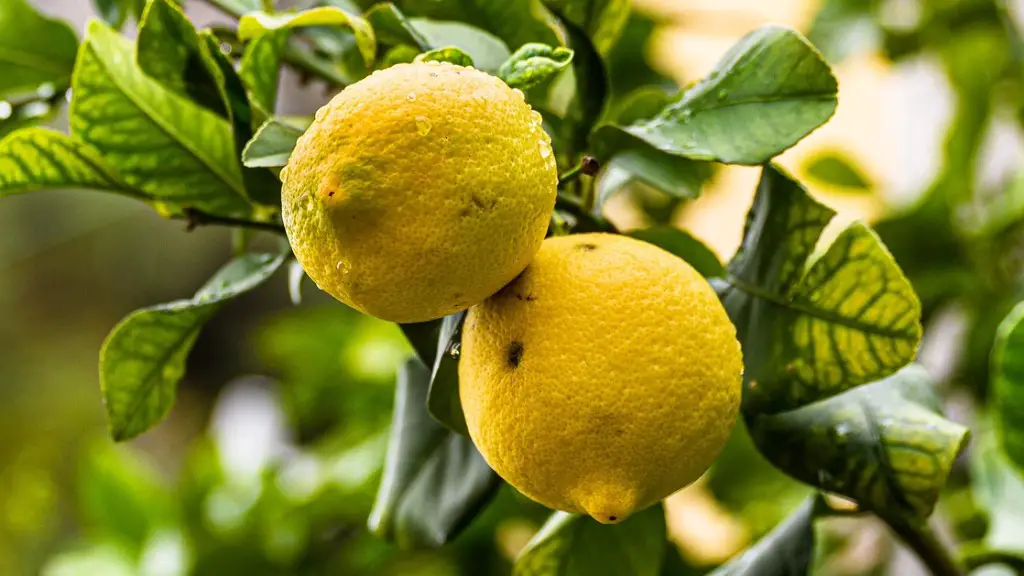Due to Colorado’s typically cold and dry climate, one might not think it possible to grow a lemon tree in this region. However, there are a few tricks that you can employ to successfully cultivate your own lemon tree in Colorado. Firstly, you must select the right variety of lemon for this region. If you want to grow a lemon tree in Colorado, you’ll need to choose one that can tolerate colder temperatures. Generally, Lisbon or Eureka lemon trees perform the best in cooler climates.
Once you have chosen the correct variety of lemon tree, you’ll need to make sure that you are providing the right conditions for it to grow and thrive. Lemon trees require lots of sunlight, so always ensure that you select a place in your garden which is bathed in sunlight or even place your tree in a pot and take it indoors during the winter months.
When it comes to watering, it is wise to regularly check the soil. If the top inch of soil is dry to the touch, then water the tree until the water has gone all the way through the soil and any pot you might have the tree planted in. You’ll need to water the tree more frequently during summer months, as too much dryness can adversely affect lemon growth.
These trees do not require a lot of fertilization. However, you’ll want to provide your lemon tree with a dose of the essential macronutrients such as nitrogen, phosphorous and potassium during the growing season.
Finally, because of the cold and dry climate of Colorado, you must protect your lemon tree from any frost that occurs. If you’re growing your lemon tree in a pot, you should bring it inside your home during these times. However, for in-ground trees, you may want to consider laying a protective cloth such as burlap over it to protect it from the harsh temperatures caused by frost.
Lemon Tree Pruning
Pruning is a critical task granted the environment that is Colorado, as it helps the lemon tree to survive any extreme temperatures. It is particularly essential in the colder months, and lemon trees should be trimmed back several times a year. This helps to reduce the stress on the tree caused by extreme weather conditions and will help your tree to remain healthy. Additionally, pruning will produce more bountiful yields.
Maintaining a Lemon Tree in Winter
As previously stated, you’ll need to bring lemon trees grown in pots indoors during the winter as they cannot tolerate extreme cold. If you grow your trees in the ground, you must also protect them from frost. A thick layer of mulch around the base of the tree can help to reduce damage caused by cold. Additionally, you can place protective cloth over the tree during severe cold weather or frosty nights.
Common Diseases to Beware of
Unfortunately, lemon trees can often become prone to common issues like root rot, scab and sooty mold. However, if you take the necessary steps to control these problems, you can successfully prevent them from becoming an issue. Firstly, it is essential to follow a regular watering cycle as this helps to prevent root rot due to over-watering. Additionally, regularly checking for any signs of insect infestation can help to prevent scab diseases occurring. Lastly, to help protect the tree from sooty mold, try to keep the area around the tree free from other nearby trees, such as oak trees, which are a hub for this particular issue.
Harvesting Your Own Lemons
Once you have successfully maintained your tree and have done all you can to create the right conditions, it is time to reap the rewards of growing your own lemon tree. The fruit should be ripe and ready to pick when it is a yellow-orange colour. You’ll need to carefully cut the lemons off the branch, so as not to cause damage to the tree. Once you have harvested the fruit, you can enjoy it straight away or preserve it and enjoy at a later date.
Protecting Your Lemon Tree from Pests
Lemon trees can attract all sorts of pests, and if you don’t handle the problem quickly, it can be damaging for the health of the tree. In order to minimize the risk of pests, you should always check your tree for any signs of infestation. Particular pests to watch out for include scale, spider mites and aphids. If you notice any of these, you’ll want to use an insecticide such as neem oil to help get rid of the problem.
Applying Mulch Around Your Lemon Tree
Mulching is an excellent way of helping your lemon tree survive in colder climates, such as Colorado. Not only does it protect the tree against extreme weather conditions, but it also serves as a natural fertilizer. Applying mulch also helps to retain moisture in the soil, reducing the number of times you need to water the tree. It is possible to purchase mulch specifically for lemon trees, but you can also use standard mulch if necessary.

